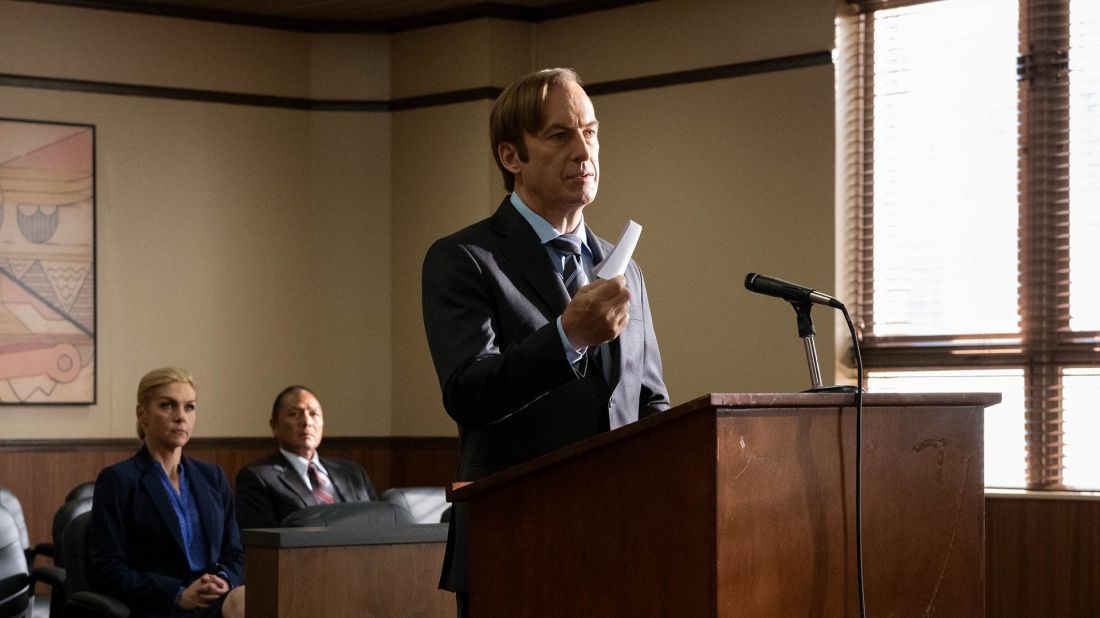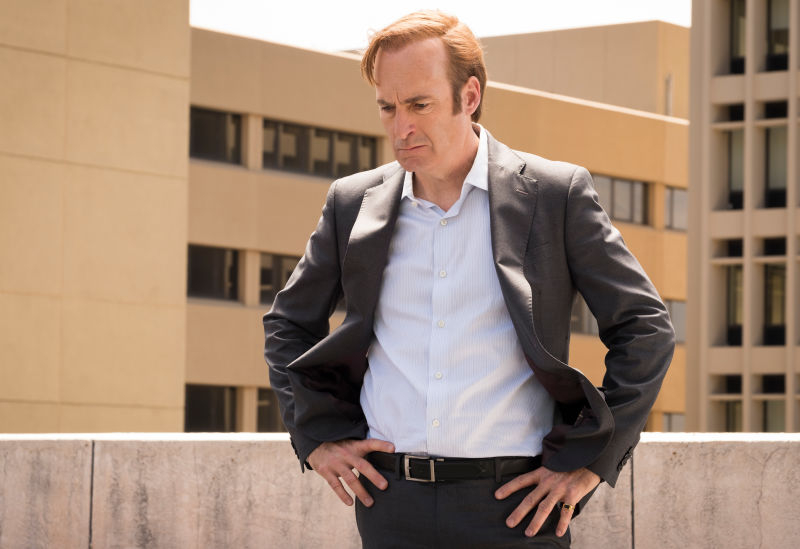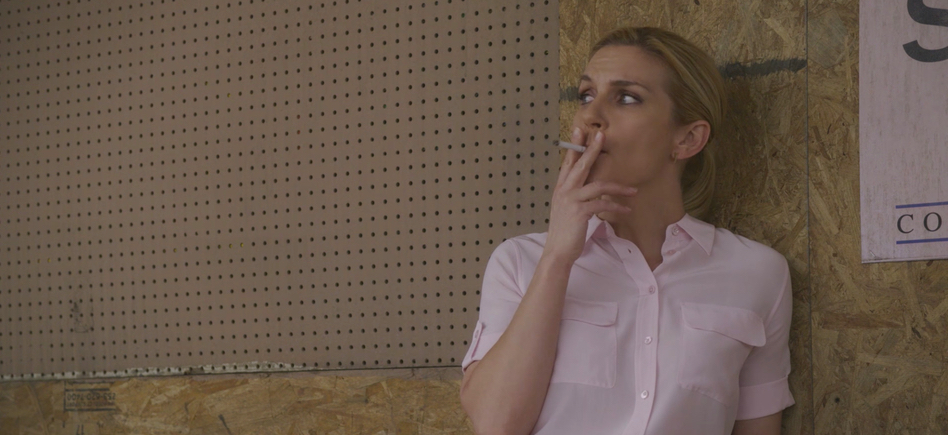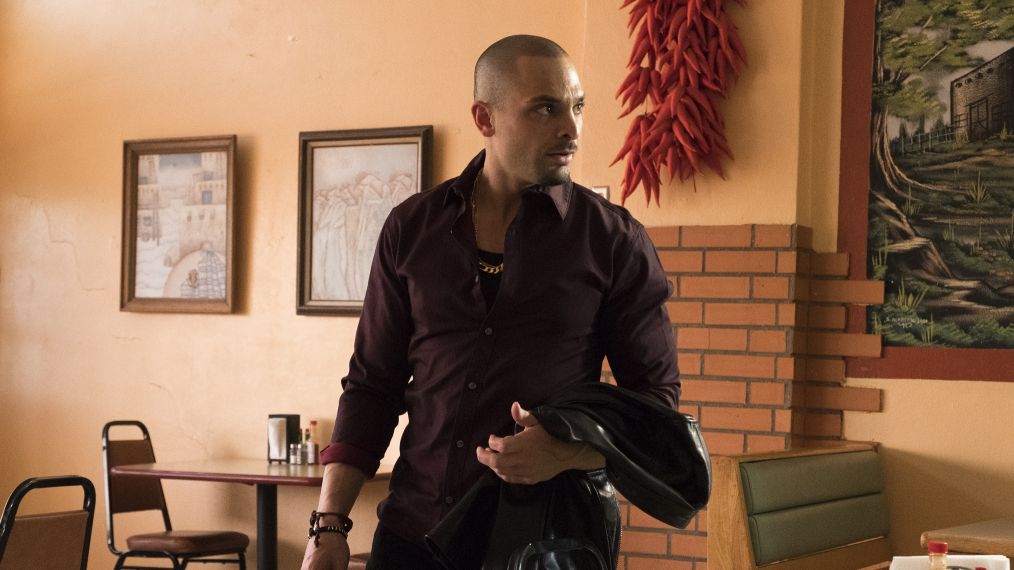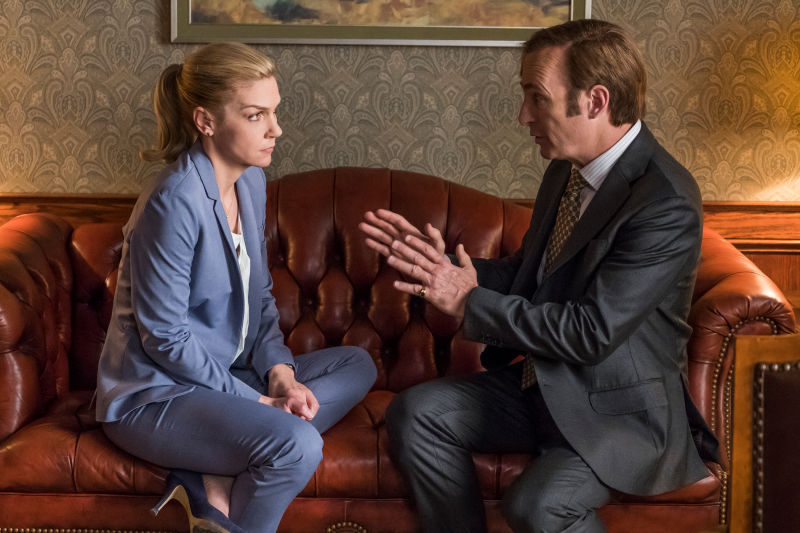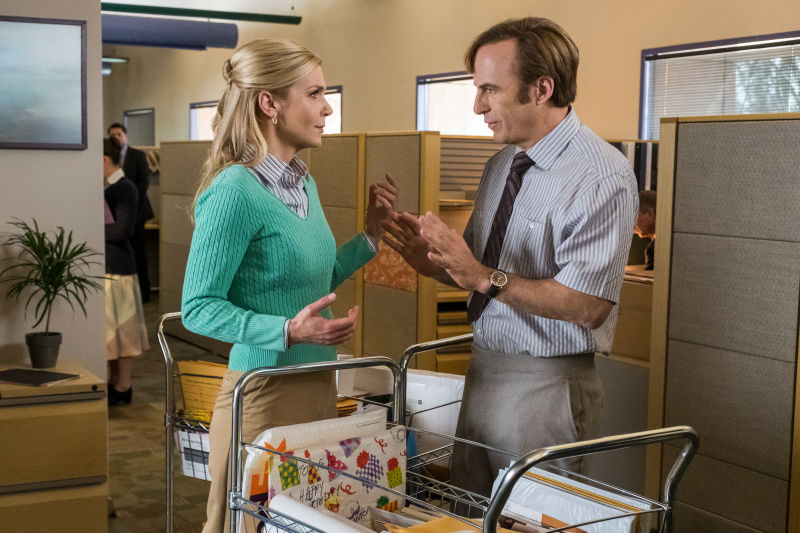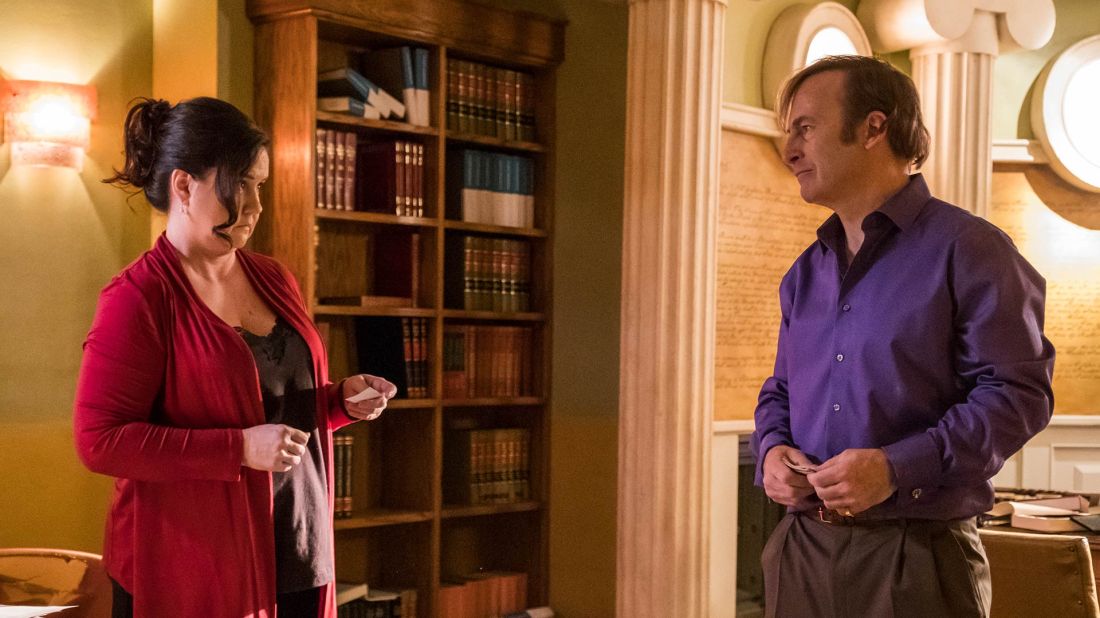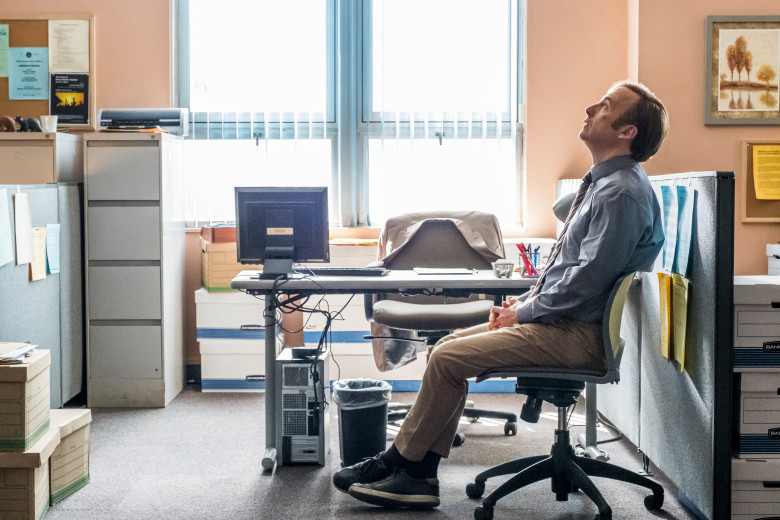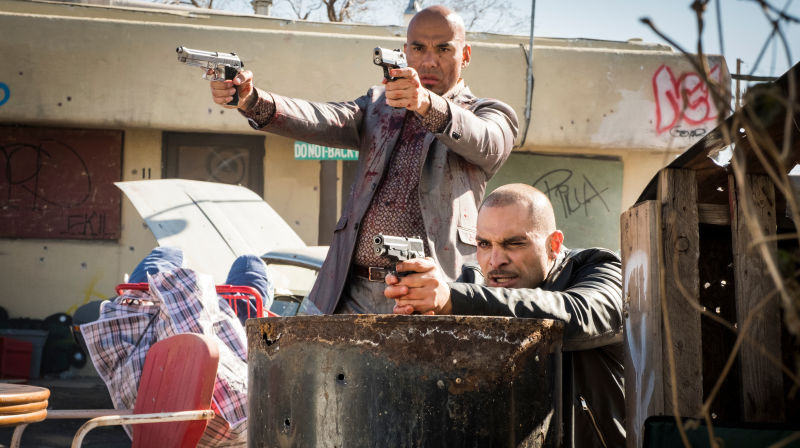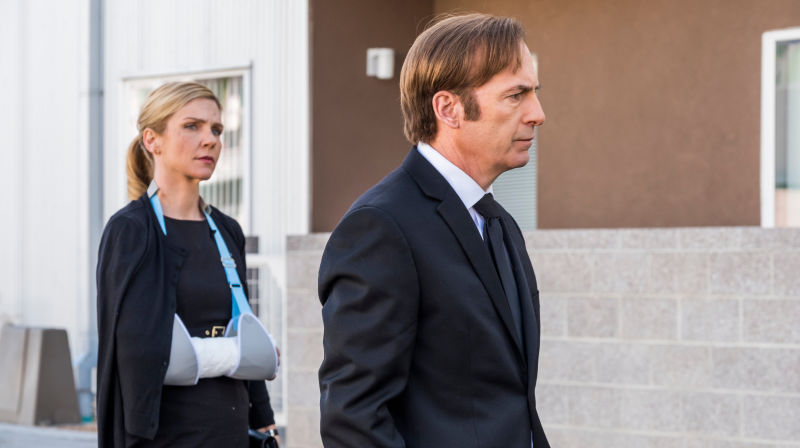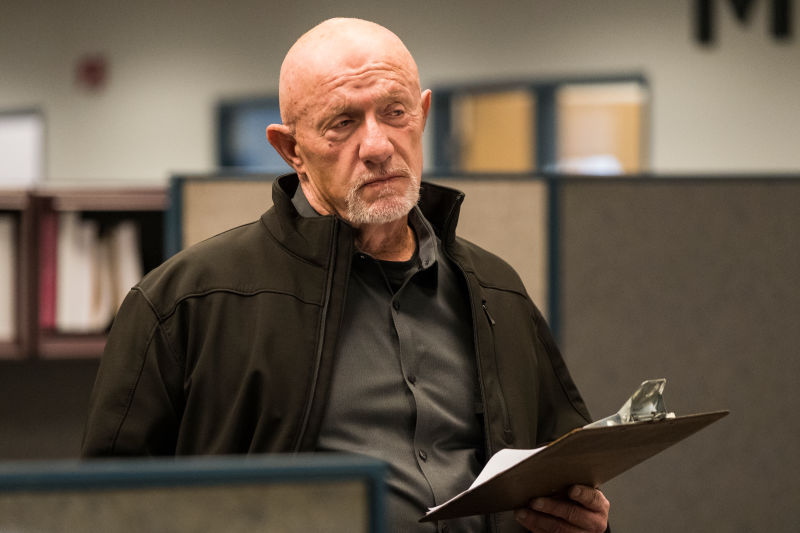Juxtaposition.
I’ve probably sounded like a major rube uttering that word in most of these reviews reviews this season, but it bears repeating; as much as Better Call Saul is a show about people with good intentions beaten down to the point where they feel compelled to turn to the life of evil they seem accustomed to when we see them in Breaking Bad, it’s also a show about varying scales of such descents into depravity.
This show has always been about propping up the bad things that Jimmy McGill does for comparison against the bad things that are happening in the world of New Mexico’s drug cartels that he will eventually be introduced to. For we know Jimmy to have that aura of a slimeball within him, resorting to doing bad things when life pushes him down one too many times. But bending the law and, as was the topic of discussion in his arc in last night’s finale, “Winner”, feigning sincerity, is still a far stretch away from the moral bankruptcy of his eventual employers. So it’s not enough to merely explain how the mild-mannered, fast-talking, sometimes two-timing brother of a respected lawyer can go from Jimmy McGill to Saul Goodman, it also has to be explained how things on the other side of the spectrum get so crazy and dire that they need to drag a Saul Goodman into things.
Last night’s finale ends with Jimmy quite literally becoming Saul, after four years of fans wondering when and how that was going to happen. And the funny thing is that it happens so subtly, with little fanfare. After successfully appealing the bar’s decision not to give him his law license back by pretending to be moved by a letter his brother wrote him before his death, Jimmy nonchalantly tells the clerk who gives him the good news that he wants the form needed to change the name under which he’ll be practicing law. When a confused Kim asks him what’s going on, he merely responds “S’all good, man,” much to her dismay, just moments after shedding legitimate tears at what turns out to be his phony sincerity.
It probably isn’t the big, crazy moment that some might have envisioned. Jimmy isn’t forced into becoming Saul because of a deal gone bad or a threat on his life or anything like that. Life merely chips away at him enough that he decides to shed his persona and the name attached to it and become something else in order to flourish. In his eyes, being in the shadow of his brother Chuck has never given him an advantage (even though, as we saw in the cold open, Chuck gladly stood by his side when he first got his license and even carried him home after he had one too many to drink at his karaoke celebration later that night). Obviously the point is that Jimmy isn’t 100% in the right here. Chuck was a dick, and he probably didn’t care for Jimmy as much as you’d expect a brother to, but Jimmy was a fuck up regardless of Chuck (just as Chuck’s problems weren’t sourced to Jimmy). In “Winner”, Jimmy uses his brother’s name one last time and chooses to fully divest himself from it and go his own way. Like I said, not a big, crazy moment, just another inch forward on a long road. Still, the show manages to stick the landing on this moment with grace, as it always does, rendering yet another gut punch to an unassuming Kim and to the audience.
Things aren’t so subtle, however, at the other end of of the spectrum, as Mike races to find a recently escaped Werner before Gus does, in hopes of saving him from certain death. Mike does his thing, and it’s wildly entertaining. But unbeknownst to him, he’s being followed by Lalo, who is a welcome wrench thrown into this show’s works. He doesn’t have the kind of grace that the writers have had us grown accustomed to with Mike. He’s sloppy, unpredictable and crazy. When Mike first notices him following his car, he drives into a parking lot and breaks the ticket machine. It distracts Lalo just enough, but like I said, he’s crazy, so he plows through the car in front of him and the barrier in order to make his escape. He then returns to the money wire store where the hunt for Werner first began, and instead of appealing to the clerk the way Mike did, he simply crawls into the vents, comes crashing through the ceiling and takes what he wants. He proceeds to deliver the nail in Werner’s coffin when he calls the resort Werner is staying at, waiting for his wife, and pries some information out of him regarding the meth lab. It’s not much, but it’s a leak that very much convinced Gus that his agreement with Werner cannot be salvaged.
And because Mike has come to know and like Werner, he offers to be the one to kill him, a development that’s paramount to where this show is headed. We know that Mike’s killed before, but we’ve never seen him do it, and certainly not yet for Gus. There is a tangible difference between the stoic, grumpy man who wants to do right by the family his son left behind, and the cold-blooded fixer we came to love on Breaking Bad. Being forced to murder his friend in cold blood (no less to fix what could be perceived as his own mistake or lapse in judgment, for getting too close to someone on the job) makes up a lot of that territory.
Killing Werner is a huge, character-defining moment for Mike, and paired with a smaller moment with larger implications for Jimmy as he takes the official steps to become Saul, it spells massive change for Better Call Saul in its inevitable fifth season. The way these two move in parallel is very important to all of that. And what’s so interesting about it is that Mike and Saul only shared one scene together this entire season, and it very much felt like a breakup. I’d need to rewatch the season before saying for certain if Mike’s refusal to help Jimmy steal his Bavarian Boy had any tangible impact on either of their paths, but it’ll be interesting when they meet again, Jimmy now practicing as Criminal Lawyer Saul Goodman, Mike now fully in Gus’s grasp as his killer/fixer. Maybe it’ll even be in the fallout of the whole mess with murder.
And let’s take another moment to highlight how awesome Tony Dalton has been as Lalo Salamanca, making a huge impact in his first few episodes of the show, and truly upping the ante of the craziness that will eventually fill out the environment which creates Walter White and enables everything that he does. Lalo brings a certain flair to the show that some might say was missing. At the very least, he’s an unpredictable, combustible element that makes everything around him more dangerous likely to burst into flames. I can’t even imagine the impact he’ll have next season.
Thus, two, now three very different aspects of the show begin their convergence. Jimmy is now officially Saul, Mike is a newly-minted killer, and the cold war between Gus and the Salamancas will only continue to flare up in unique, unexpected ways. Season 4 of Better Call Saul has been about revving up that convergence, and it did so in a way that never really felt boring or improperly paced, as the stakes consistently rose and as its main characters found their way to that point of no return so brilliantly depicted in the season finale. With “Winner”, and with season 4 as a whole, Better Call Saul continues to prove why it’s one of if not the best show on TV, and it gets 9.5 watermelon pickles out o 10.
Notes & Quotes:
- I’m so happy this show found a way to get Chuck freaking McGill to sing some ABBA at karaoke.
- To show how much Jimmy has changed, think about how he goes from singing karaoke with his brother to desecrating his grave for personal gain from basically one scene to the next.
- Also boasting about his anonymous donation reminded me of that great episode of Curb Your Enthusiasm.
- My only worry about the show going forward is all the characters it seems to be leaving in its wake. Nacho and Howard are basically non-factors at this point. What does Kim have left to do now that she’s helped usher in a new era of Goodman?
- I just want to point out one final time that Lalo is the best.
- “We can get by on one nipple, am I right?” – Jimmy
